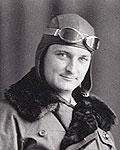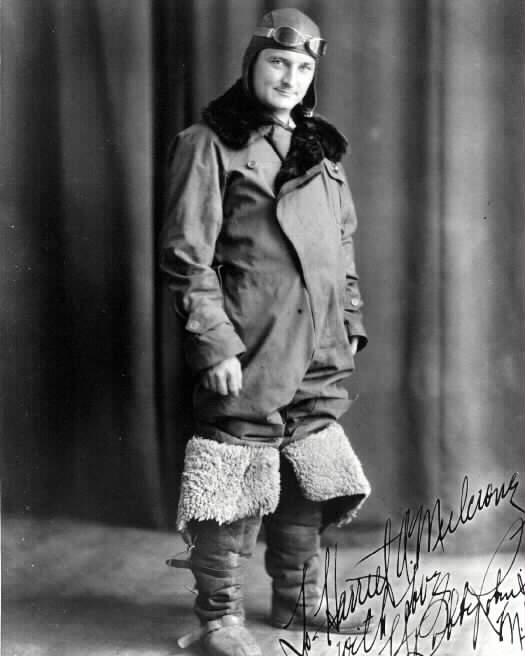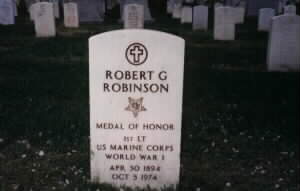Courtesy of the United States Marine Corps:
FIRST LIEUTENANT ROBERT G. ROBINSON, USMCR (DECEASED)
Marine First Lieutenant Robert G. Robinson, who earned the Medal of Honor as a Gunnery Sergeant in World War I, died 5 October 1974, at his home in St. Ignace, Michigan. Although seriously wounded during aerial action over Belgium, he continued to fight and successfully drove off attacking enemy scout planes before two additional bullet wounds forced his collapse.
For his heroism and gallantry in this and previous action with enemy planes, while attached to the First Marine Aviation Force as an observer, Lieutenant Robinson, then a gunnery sergeant, received this Nation’s highest award.
A copy of the citation accompanying his Medal of Honor follows:
“For extraordinary heroism as observer in the First Marine Aviation Force at the front in France. He not only participated successfully in numerous raids into enemy territory, but on October 8, 1918, while conducting an air raid in company with planes from Squadron 218, R.A.F., he was attacked by nine enemy scouts and in the fight which followed he shot down one of the enemy planes. Also, on October 14, 1918, while on an air raid over Pittem, Belgium, his plane and one other became separated from their formation on account of motor trouble and were attacked by twelve enemy scouts. In the fight which ensued he behaved with conspicuous gallantry and intrepidity. After shooting down one of the enemy planes he was struck by a bullet which carried away most of his elbow and his gun jammed at the same time. He cleared the jam with one hand while his pilot maneuvered for position. With the gun cleared, he returned to the fight though his left arm was useless, and fought off the enemy scouts until he collapsed after receiving two more bullet wounds, one in the stomach and one in the thigh.”
Robinson, shot 13 times in the abdomen, chest, and legs, and with his left arm virtually blown off at the elbow, helped bring the plane down in Belgian Territory. His arm, hanging by a single tendon, was grafted back on by the surgeon-general of the Belgian army. The pilot of his plane, Lieutenant Ralph Talbot of Weymouth, Massachusetts, who was posthumously awarded the Medal of Honor for this same action, was killed in a plane crash a few days later.
The Michigan native was born in Wayne, 30 April 1896. In May 1917, he enlisted with the Marines and the action in France followed. He was honorably discharged in 1919 as a gunnery sergeant and was appointed a Second Lieutenant in the Marine Corps Reserve. His retirement was effected in May 1923 and his promotion to the rank of First Lieutenant, in September, 1936. Upon retirement, he made his home at St. Ignace, Michigan. He is buried in Arlington National Cemetery, Arlington, Virginia.
The Lore of the Corps
‘Flying sergeant’ earned highest honor in WW I
By Keith A. Milks
The term “flying Sergeant” has all but dropped from the Marine Corps lexicon. But in the early days of Marine Corps aviation, it was not uncommon to see a grease-stained mechanic working on an aircraft engine one minute and climbing into the cockpit or navigator’s seat the next.
One such Marine was Robert G. Robinson. Little is known about Robinson’s youth except that he was born in Wayne, Michigan, on April 30, 1896, and grew up there. He enlisted in the Corps in May 1917 and soon was deployed to France where, by the time of Robinson’s arrival, war had raged for more than three years.
He quickly ascended the ranks and soon was a gunnery sergeant serving in the First Marine Aviation Force, where he was an aerial observer. Robinson flew combat missions over the trench-cut landscape. On October 8, 1918, as war drew to a bloody close, Robinson participated in a British-led air raid near Pittham, Belgium.
Seated in the back seat of a DH-4 pursuit bomber, ominously dubbed the “Flying Coffin,” Robinson manned the aircraft’s rear gun while his pilot, 2nd Lt. Ralph Talbot, flew the aircraft and operated its forward-firing machine guns. As they neared their objective, the DH-4’s engine began acting up and Robinson’s aircraft — along with another — was separated from the flight.
Almost as soon as they lost contact with the rest of their flight, 12 German aircraft attacked out of the clouds above them. Robinson fired and sent a German plane flaming toward the ground.
As Talbot tried to outmaneuver the attackers and their fellow aircraft disappeared, a German bullet slammed into Robinson’s left elbow, nearly severing his arm. With his left arm useless, Robinson tried to clear a jam in his machine gun using his good arm. He finally managed to clear the weapon and get it back into action.
He swept the sky with fire, keeping German aircraft at bay while Talbot tried to evade the remaining 11 planes. Suddenly, two more enemy bullets found their mark and tore into Robinson’s stomach and hip. The bullet in Robinson’s stomach fragmented into 13 pieces, and he slumped forward unconscious.
Although he was out of action, Robinson’s stoic defense bought Talbot the time and opportunity he needed. He dove toward the ground and, flying a mere 50 feet over the German lines, reached the safety of a nearby Belgian airfield.
Robinson, still unconscious, was taken to a hospital, where his wounds were treated by the surgeon general of the Belgian army, who grafted the Marine’s left arm together. Robinson spent the remainder of the war and some months after the cease-fire recovering from his wounds in a number of hospitals.
For his actions that day in the skies over Belgium, Robinson was awarded the Medal of Honor.
In mid-1919, Robinson was discharged from the Marine Corps and entered the Marine Corps Reserve as an officer.
He retired four years later as a First Lieutenant and moved to St. Ignace, Michigan. He died at home on October 5, 1974, and was buried at Arlington National Cemetery.
Talbot, a native of Weymouth, Massachusetts, who himself shot down a German aircraft during the battle and evaded the numerically superior force, also was awarded the Medal of Honor. But Talbot, a one-time student at Yale University, was killed in a plane crash 11 days after the daring aerial battle.
The pair were the first Marine aviators awarded the nation’s highest award for battlefield valor.
The writer is a gunnery sergeant stationed at Camp Lejeune, N.C.
Born in Michigan, April 30, 1896, he was awarded the Medal of Honor for service in World War I while serving with the 1st Marine Aviation Force at Pittham, Belgium, October 14, 1918.
He died on October 6, 1974 and was buried in Section 46 of Arlington National Cemetery, not far from the Tomb of the Unknowns and the Memorial Amphitheater.
ROBINSON, ROBERT GUY
Rank and organization: Gunnery Sergeant, U.S. Marine Corps, 1st Marine Aviation Force Place and date: Pittham, Belgium, 14 October 1918. Entered service at: Chicago, Illinois. Born: 30 April 1896, New York, New York.
Citation:
For extraordinary heroism as observer in the 1st Marine Aviation Force at the front in France. In company with planes from Squadron 218, Royal Air Force, conducting an air raid on 8 October 1918, G/Sgt. Robinson’s plane was attacked by 9 enemy scouts. In the fight which followed, he shot down 1 of the enemy planes. In a later air raid over Pittham, Belgium, on 14 October 1918, his plane and 1 other became separated from their formation on account of motor trouble and were attacked by 12 enemy scouts. Acting with conspicuous gallantry and intrepidity in the fight which ensued, G/Sgt. Robinson, after shooting down 1 of the enemy planes, was struck by a bullet which carried away most of his elbow. At the same time his gun jammed. While his pilot maneuvered for position, he cleared the jam with one hand and returned to the fight. Although his left arm was useless, he fought off the enemy scouts until he collapsed after receiving 2 more bullet wounds, one in the stomach and one in the thigh.
ROBERT G. ROBINSON DIES; WORLD WAR I HERE WAS 78
ST. IGNACE, Michigan, October 8, 1974 – Robert G. Robinson, a World War I Medal of Honor winner, was found dead Saturday in the garden outside his rural cabin 10 miles north of here. He was 78 years old.
Mr. Robinson received the nation’s highest military decoration after an air battle in which he shot down a German plane, then held off 11 more attacking fighters after machine gun bullets had shot away most of his left elbow.
He was a Marine Corps Gunnery Sergeant when the incident occurred October 13, 1918 over Belgium. Mr. Robinson spent 11 years in military hospitals after the war, recuperating from 21 bullet wounds.
The Marine Corps give the Robert G. Robinson Award annually to its outstanding flight officer.
ROBINSON, ROBERT G
1ST LT US MARINE CORPS
WORLD WAR I
- DATE OF BIRTH: 04/30/1894
- DATE OF DEATH: 10/05/1974
- BURIED AT: SECTION 46 SITE 390
ARLINGTON NATIONAL CEMETERY
Michael Robert Patterson was born in Arlington and is the son of a former officer of the US Army. So it was no wonder that sooner or later his interests drew him to American history and especially to American military history. Many of his articles can be found on renowned portals like the New York Times, Washingtonpost or Wikipedia.
Reviewed by: Michael Howard



